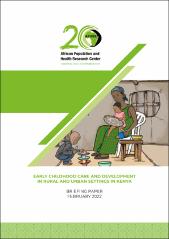| dc.contributor.author | Kimani-Murage, Elizabeth | |
| dc.contributor.author | Mwaniki, Elizabeth | |
| dc.contributor.author | Nampijja, Margaret | |
| dc.contributor.author | Onyango, Silas | |
| dc.contributor.author | Oloo, Linda | |
| dc.date.accessioned | 2023-08-28T13:45:17Z | |
| dc.date.available | 2023-08-28T13:45:17Z | |
| dc.date.issued | 2022-02 | |
| dc.identifier.uri | http://10.176.203.77/handle/123456789/270 | |
| dc.description.abstract | The early years are critical for children's optimal health and developmental outcomes. However,
too many children are spending their early years in suboptimal environments, with negative
implications for their development and lifetime opportunities. This is especially so for those who
are most disadvantaged, including children living in informal settlement settings or marginalized
communities. As more mothers join the workforce, one of the difficult choices they need to make
is where to leave their children while they are at work. In informal settlements, lack of affordable
quality child care often keeps women out of the workforce or from re-entering the workforce after
childbirth. For mothers who live in communities where paid work is less common and where there
is less demand for childcare, there remains a lack of information to support parents and
communities in the principles of nurturing care in many African settings. | en_US |
| dc.description.sponsorship | British Academy | en_US |
| dc.language.iso | en_US | en_US |
| dc.publisher | APHRC | en_US |
| dc.subject | Maternal and Child Wellbeing | en_US |
| dc.subject | Early Childhood Development | en_US |
| dc.subject | ECD | en_US |
| dc.subject | Informal childcare centers | en_US |
| dc.subject | Communities of Practice | en_US |
| dc.title | Early Childhood Care and Development In Rural and Urban Settings in Kenya | en_US |
| dc.type | Working Paper | en_US |

